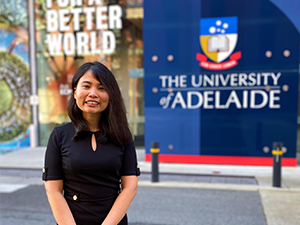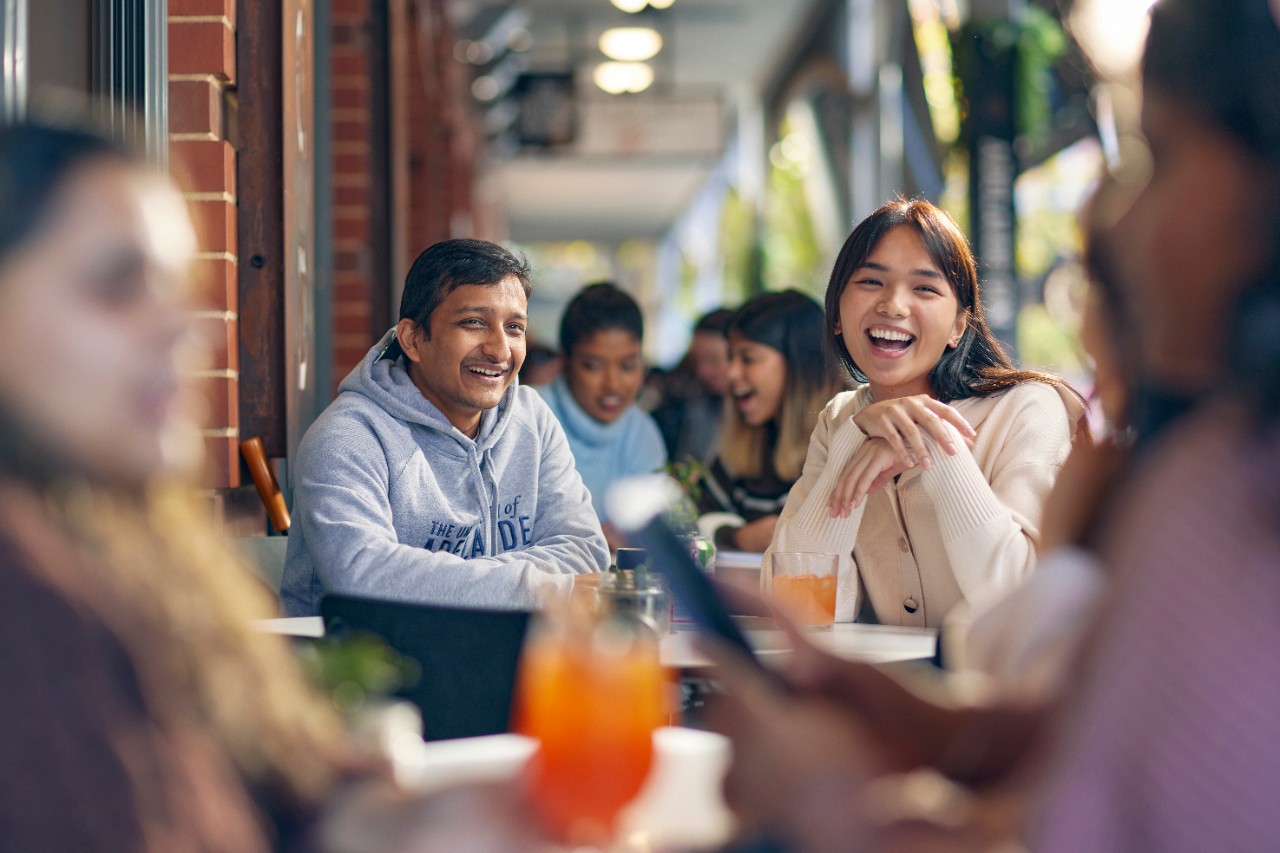Sereysothea Sao
 Country: Cambodia
Country: Cambodia
Degrees: Master of Global Food and Agricultural Business
Faculty: Arts, Business, Law and Economics
Why did you choose your degree?
I’ve always believed there are a number of opportunities to unleash the potential of Cambodia’s agriculture and food sector. I decided to pursue a Master of Global Food and Agricultural Business because I wanted to explore new ways of thinking and doing to enhance innovation, performance and management of the agriculture and food industry in Cambodia in sustainable manners. Prior to attending this program, I worked for several years in market research, product and enterprise development in the field of water, sanitation and agriculture. I have worked with hundreds of farming communities across rural Cambodia and this experience allowed me to understand certain pressing issues along agricultural value chains, as well as to develop my strong interest in searching for effective solutions to agricultural market issues in Cambodia.
Why did you choose to study at the University of Adelaide?
There are two main reasons that I chose the University of Adelaide. The first reason is that the University of Adelaide provides such a personalized postgraduate program in Global Food and Agricultural Business, in which I were able to tailor unique learning opportunities based on my interest and career aspiration. As my experience, I took several elective courses in marketing areas and applied project management. These courses offer alternative perspectives once it comes to design solutions to agricultural and food market issues. For another reason, the University of Adelaide’s Centre for Global Food and Resources is an extraordinary learning resource for students like me to explore different insights and perspectives through accessing the most recent research papers, engaging with a number of multidisciplinary experts with academic, industry and policy experience through lectures and seminars. Moreover, the University of Adelaide has also established global and regional agri-food industry networks and it is a tremendous advantage for me to leverage on. For instance, I have connected and networked with real business communities through actively participating a number of regional agri-food industry events, such as Food South Australia Summits, EvokeAg2020 Asia Pacific AgriTech conference, and TropAg2019 conference.
What do/did you enjoy about your degree?
I really enjoyed my postgraduate degree because this program is mainly designed to challenge as well as empower students to think outside the square. I love how each course enabled me to analyze and discuss the most recent world food’s challenges, which are pressurized by the effects of climate change, limited natural resources, a shift of dietary patterns, and an increasing population trend, plus the current hungered population and the increasing obese consumers.
Sereysothea Sao
More importantly, I’ve always been fascinated by learning from the effectiveness and failures of previous and current interventions and solutions to these challenges from policy aspects to business levels in developed, developing and least-developed countries.
Did you undertake a global learning experience/internship whilst studying at the University? If yes, describe your experience.
I had opportunities to work on 5 business projects, as an intern and a consultant. I assisted two companies (Urban Food Garden and Austofix) to conduct a new market entry assessment and preparation for the North America market (The USA and Canada respectively). For another project, I led a team of four student consultants to conduct a critical review and develop an engagement strategy for AAI Global Skills Passport Project, and our project client was Coffey based in South Australia.
Apart from this, I also took a lead of five international students (from La Trobe University, James Cook University, Monash University and Western Sydney University) to conduct a competitive landscape analysis and suggest an actionable strategy for TheXword ( a startup based in Melbourne) to support and engage with the targeted clients during the lockdown. For the final internship project, I co-conducted the performance evaluation for the sustainability of the savings groups on the Tonle Sap lake project, under the coordination of Conservation International.
In short, these experiences gave me the chance to deploy knowledge, analytical and leadership skill, enhanced my ability to communicate and deliver expected outcomes within limited timeframes. In addition, I would say undertaking these five different projects has boosted my confidence and creativity to the next level, in terms of applying new knowledge in designing solutions to real business issues.
What are your career aspirations after university?
I want to be a person who inspires and supports the agri-food industry to think ambitiously about the future of our farm and food business. More importantly, I do believe that leading by example is a key to effectively engage with different stakeholders to enhance our agri-food industry performance in both local and international markets.
What job role do you have now (if applicable) and what kind of work does that involve?
I returned to Cambodia after completing my degree in December 2020. I have recently started working as a Co-founder and CEO of BONG Snacks. Our new startup is committed to sourcing local and natural ingredients to make a variety of wholesome and tasty snack options for consumers.
Since last year, we have participated in an incubation program, organized and facilitated by Energy Lab Cambodia. Through this program, we have explored clean energy in order to enhance our production capacity, and tested some of our products, such as “dried lady finger banana energy balls” in markets.
Currently, it is at the early stage and there are a number of exciting and challenging assignments that we need to work out, in particular exploring effective ways to introduce our new values to the targeted market segment, as well as to optimize our productivity, including product quality enhancement with regard to food safety. My role in this ventures is to lead and work with the team to empower consumers to uptake healthy snacking habits, through offering a variety of wholesome snacks in marketplaces. Indeed, I am also responsible to design and establish a profitable business operation in a sustainable manner. I believe that this new venture will be a solution to postharvest loss, and agricultural market issues. More than food processing, it is a way to diversify new selling channels for our village's raw products, possibly with an increase of extra income for the village.
I am so excited to employ my new knowledge, skillsets and networks to validate these assumptions. I admit I have no magic to ensure this goal succeeds. Yet, I firmly believe that being adaptive and agile will be key attributes for me to lead, validate, learn and pivot solutions for creating new values in food and snack marketplaces. Plus, working harder and smarter will potentially enable me to make a difference.
What courses did you enjoy the most? How does your study relate to your career?
There are several courses that I really enjoyed the most. There were such as Trends & Issues in the World Food System, Innovation Systems and Policy Transformation, Management and Performance of Global Food Chains, Systems Design for projects, Strategic Marketing, and Developing Global Market. These courses gave me tremendous opportunities to obtain, discuss, and understand food systems with holistic perspectives. Furthermore, by understanding the significant roles and influences of both external and internal stakeholders along value chains, it has inspired me to think differently that no matter where I work in agri-food systems, there are possibilities that I can contribute to make a difference. Besides, what fascinated me is that there is no perfect single solution to tackle the world’s agricultural and food issues. Indeed, once it comes to designing any solution, a great reminder is that "context matters". To me, this is an inspiration to review and unleash local potential and creativity to innovate and validate solutions to agriculture and food issues in Cambodia.

